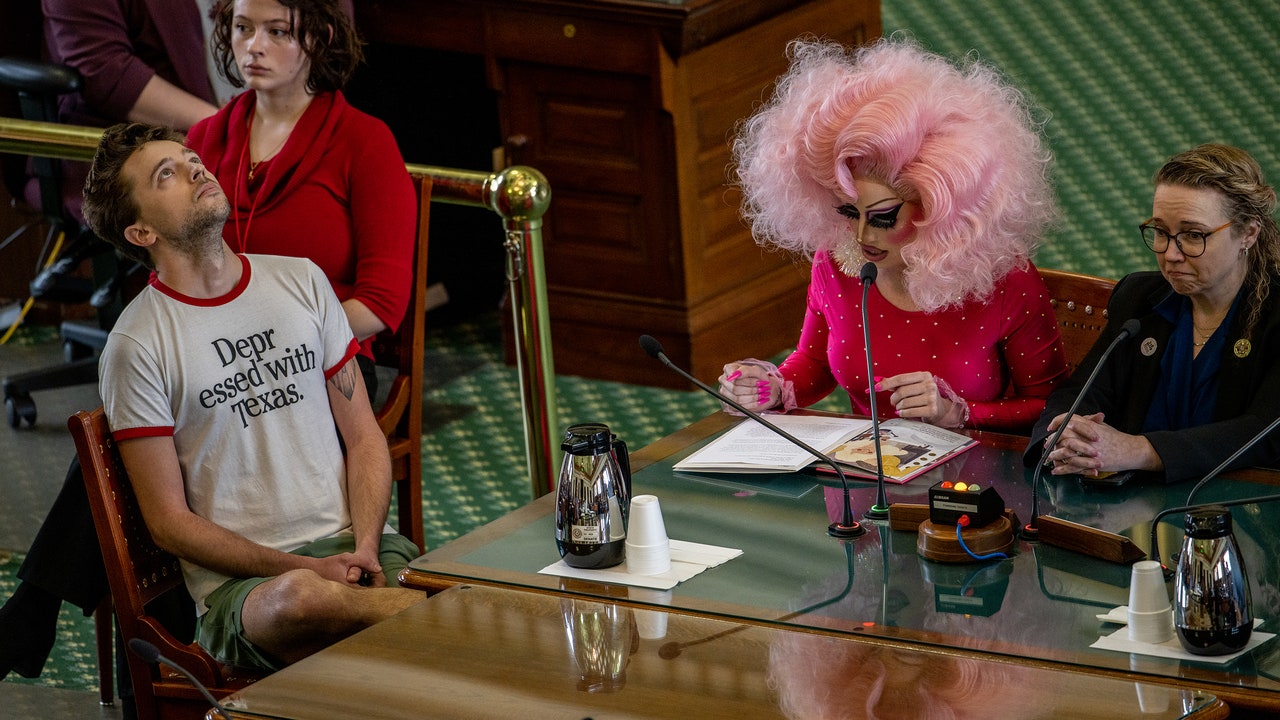In 2020, it seemed that the biggest threat to drag shows in Texas was the pandemic. When venues shut down and drag brunches were cancelled, some performers got resourceful. An Austin woman named Kerry Lynn launched Extragrams, a drag-queen telegram service: Kerry Lynn would show up at your house with a boom box and a queen in a glittery costume, and you’d get a brief, socially distanced drag show in your driveway, a little sparkle to liven up the long pandemic days.
One of Extragrams’ performers was Brigitte Bandit, an Austin native who often performs as Dolly Parton—huge hair, heavy eyeliner, ostentatious cleavage. “It’s wild to think about how we would just perform in people’s front yards,” Bandit told me recently. That kind of lighthearted public exuberance has become unthinkable in the past two years, as drag has become a culture-war flash point, and half a dozen states, including Texas, have passed anti-drag legislation. Now when Bandit is hired to perform an Extragram, she makes sure to do it somewhere more private—in a fenced-off back yard, say, or in a living room. “Just walking from my car to the gig, let alone doing a whole performance in someone’s driveway—we don’t even feel safe doing that,” she said.
Earlier this year, Bandit became one of five plaintiffs in a lawsuit that challenged Texas Senate Bill 12, which criminalized some drag performances if they occurred in the presence of minors. Her critiques of the legislation have repeatedly gone viral, making her a notable figure in the Austin drag scene. Her prominence has been questioned, because, unlike most people who perform as drag queens, she was born female. (Bandit is nonbinary and uses both they/them and she/her pronouns.)
Bandit grew up with the idea that femininity meant fashion, spangles, performance. The first concert she saw was Cher; the second was Parton. When Bandit was a child, her mother worked as a stripper. She had breast implants and wore elaborate costumes that she made by hand. “She was very, I guess, you know, gendered,” Bandit said. “She would put on these big production numbers with a lot of impersonations. Cher was a big one for her. She was basically doing drag in the strip clubs.” One day, Bandit’s mother saw an advertisement for a Cher-impersonation contest at a gay bar in Austin. “At first, people were, like, ‘This woman can’t enter the contest!’ ” Bandit said. Ultimately, her mother was allowed to compete, and won second place.
Bandit has always dressed flamboyantly and in bright colors; she was intrigued by the idea of performing in drag but assumed that it was off-limits to her. Then someone sent her a video of Sin Wai Kin, a drag queen who is a cisgendered woman. “I started crying,” Bandit said. “It was like a revelation to me.” Some people saw Bandit as an interloper in a space that is a haven for queer men and trans women. (“I have more drag in my pinkie finger than you’ll ever have in your whole life,” a fellow-queen told her.) Other performers were more welcoming. It helped that, though drag in other Texas cities was dominated by the pageant community, Austin’s scene was more expansive and experimental. “You don’t have to just be in rhinestones with big hair,” Tension, a longtime Austin performer, told me. “There are drag kings. There are burlesque-style performers and comedy shows and all-Black shows. There’s just such a wide variety.”
The outpouring of vitriol that began a year and a half ago caught the drag community by surprise. “It felt like day and night,” Tension said. “There was a lot online, but when it started happening in real life is when it started to get real.” A man named Tayler Hansen began attending drag shows in the Austin area, filming performances and posting clips online. He parlayed his viral clips into an appearance on Tucker Carlson’s Fox News program. “There are no dads there ninety-nine per cent of the time,” Hansen told Carlson. “A lot of the time, the people that bring these kids to these shows are single mothers who happen to be obese. I don’t know if there’s a pattern there or what.” Posts by anti-drag activists were sometimes doctored in misleading ways, including one that spliced together images of children at an all-ages drag show with footage from a raunchier adults-only event.
Spurred on by conservative media, the drag backlash spread with disorienting speed. Bars and restaurants that had hosted drag events for years were suddenly inundated with threats. Some venues cancelled performances; others increased security. “We’ve had people stand outside the show and yell homophobic slurs,” Richard Montez, who hosts drag events at Tomatillos, his family’s restaurant and bar in suburban San Antonio, said. “We’ve had people record our entertainers. There was a group of people who called the police while our show was happening. They kept saying, ‘This is illegal.’ We knew better—we’d been following the laws, we knew nothing had passed yet. But they were just convinced that the police would shut us down.” In June, an anti-drag group posted the legal names and home towns of numerous Texas drag queens, including Bandit, identifying them as “groomers” and accusing them of “advocating for the sexualization of children.”
